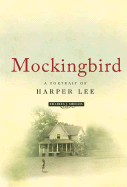Monday, June 12, 2006
MOCKINGBIRD by Charles J. Shields
 Kam McHugh reviews MOCKINGBIRD: A Portrait of Harper Lee by Charles J. Shields (Henry Holt, 2006).
Kam McHugh reviews MOCKINGBIRD: A Portrait of Harper Lee by Charles J. Shields (Henry Holt, 2006).Harper Lee has always been a difficult target for biographers and fans. Not long after she published her masterpiece, To Kill a Mockingbird, she retired to her hometown of Monroeville, AL, where she has lived ever since. She routinely turns down requests for interviews. Unfortunately for biographer Charles Shields, she proved to be no different this time around. This biography was not created with the assistance of Ms. Lee, who even turned down the author’s requests to verify facts through the mail.
Despite these obstacles Shields has written a fairly thorough biography. There has never been another book about Lee so it is difficult for a reader to compare facts. But Shields manages to write a very readable and convincingly accurate biography mostly based on interviews.
The reader comes away with a fairly good idea of the personality of Lee – her tomboyish upbringing which produced an unusual perspective on life, a quick wit, and strong desire for independence. This book does a lot to break down many of the mysteries of this mythical author and her friends, mainly Truman Capote. Shields’ draws closure to the question of who actually wrote To Kill a Mockingbird, Lee or Capote. He also adds a little more about who was responsible for In Cold Blood, but you’ll have to read this biography to find out.
Kam McHugh, Randolph Branch Library
Labels: Biography
Comments:
I know that I need to read this book. First of all because I am fascinated, as are many, by Harper Lee. Secondly, I read another review recently of this book which suggested that the author’s views may have been skewed by the fact that Lee told others not to talk to him. Is this true or not?
Heather,
Did the review you read suggest that Shields was less than fair or not objective or even mean-spirited because Harper Lee blocked his access to her friends?
***
It's an interesting contrast that Harper Lee is so secretive while Truman Capote revealed so much about his life through his writings. Or, perhaps his revelations weren't about him but about his interactions with social elites and the In Cold Blood murderers.
I wonder what Harper Lee thought of Capote's PARTY OF THE CENTURY?
Did the review you read suggest that Shields was less than fair or not objective or even mean-spirited because Harper Lee blocked his access to her friends?
***
It's an interesting contrast that Harper Lee is so secretive while Truman Capote revealed so much about his life through his writings. Or, perhaps his revelations weren't about him but about his interactions with social elites and the In Cold Blood murderers.
I wonder what Harper Lee thought of Capote's PARTY OF THE CENTURY?
I recently saw the movie Capote which portrays Lee in a generally sympathetic light. I guess we should assume the director had absolutely no input from Lee while filming the movie?
Post a Comment



